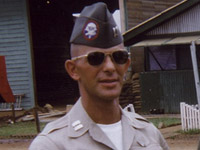|
"Our job was to support the infantry and their life was absolutely miserable, so whatever we did to make it better, that's what we did." (Video interview, Part 2, 1:47)
|
|
{
align: 'left'
}
|
John Lansford McCullough |

John L. McCullough in uniform, prior to leaving for Hong Kong; Pleiku, Vietnam [1966] | Vietnam War, 1961-1975
Army
Headquarters, 23rd Infantry Division; 170th Assault Helicopter Company and 155th Assault Helicopter Company, 52nd Combat Aviation Battalion, 1st Aviation Brigade
Fort Jackson, South Carolina (basic training); Fort Lee, Virginia; South Korea; Fort MacArthur, California; Fort Hood and Fort Wolters, Texas; Germany; Fort Benning, Georgia; Fort Bragg, North Carolina; Pleiku, Ban Me Thout and Chu Lai, Vietnam; Fort Rucker, Alabama
Major
TN
 |
|
 |
John McCullough's family tradition--two uncles in the Navy, his father a career Army man--served him well when he enlisted in the Army Reserves as a senior in high school. He had three goals in mind when he joined, though those changed a bit as he encountered certain obstacles. He had been in the Army for over ten years when he was assigned to the first of two tours of Vietnam, flying helicopters on support missions and training crews and other pilots. He did get to see his father, who was still serving and was in country during his son's first tour. McCullough's collection includes home movie footage shot in country, a visual accompaniment to his candid and detailed interview.
|
|

